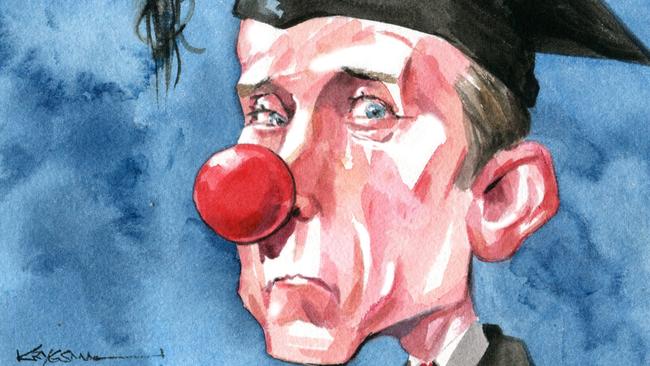
Andrew Leigh is not a particularly uncommon name. I’m sure there are quite a few of them in Australia. But one thing that does confuse me is the difference between Professor Andrew Leigh and Andrew Leigh MP. Are they the same person or are they different men?
Once upon a time, Professor Leigh was a thoughtful, logical and prolific academic at the Australian National University. His interests were wide-ranging and generally policy-related. He used data to test some important propositions.
For example, he used the natural experiment of Western Australia doing its own thing in relation to minimum wage setting in the 1990s as a test for whether higher minimum wages reduced employment. On the basis of the six occasions during which that state imposed larger increases in the minimum wages applying to workers in that state relative to the national average, he was able to establish that, yes, higher minimum wages did contribute to lower employment. (His measure was the employment-to-population ratio.)
The effect was relatively modest — a lot of other factors were affecting employment — but the impact was greater on more marginal workers, particularly the young and unskilled. This is, of course, standard stuff that any sensible economist would predict.
Unsurprisingly, now that Professor Leigh has transformed into Leigh MP, Labor member for Fenner, this research result, plus a number of others, is a little embarrassing.
It is one reason that Leigh MP, now shadow assistant treasurer and shadow minister for a range of economic bibs and bobs, seldom asks a question in the House of Representatives. In doing so, the opposition leaves itself open to having some of Professor Leigh’s inconvenient research findings thrown back in its face by the government.
Mind you, it’s not just about minimum wages. Professor Leigh was very interested in the determinants of student performance. His empirical research led him to conclude that lower class sizes — at least below 30 — had no noticeable impact on how well students performed. Moreover, the acquisition by teachers of additional qualifications such as master’s degrees was not found to lead to better student outcomes.
Neither of these results accords with the preferences of the education unions. They want smaller class sizes so there can be more teachers and more union members. And they want automatic pay increments for teachers who obtain higher qualifications. Again, Leigh MP has had to effectively disown his previous careful research.
Of course, Leigh is hardly Robinson Crusoe for being a tad embarrassed by his pre-parliamentary career exploits.
But what marks Leigh MP apart from other parliamentarians is the extent to which he has made a complete goose of himself since he has been in parliament, as he utters more and more ill-informed tripe on inequality, competition and taxation.
I now think of him as our own Jeremy Corbyn, or Bernie Sanders of Australia but with a PhD.
Let me run through some of his howlers in the past two years or so. His view of Australia seems to be that it is run by a series of malign oligarchs who control vast swathes of industry, exploiting workers and offering a poor deal to consumers. And it is only getting worse.
Take this example: according to Leigh MP, the “overlapping ownership of competing firms is a growing problem”.
His thesis was that large firms in the same industry were owned by the same people and so the owners would do their best to thwart competition. It was a case of “five faceless investors”. The trouble for Leigh MP, and it showed how out of touch he was with the realities of financial markets and the real economy, was that he didn’t understand the difference between custodian shareholders — HSBC, National Nominees, JPMorgan and the like — and the real beneficial owners. He mistook the custodians to be the owners who would vote on firm strategy.
It was a truly excruciating mistake because these custodians don’t vote; indeed, their arrangements with the real owners are based explicitly on their abstaining from voting. Unsurprisingly, Leigh was forced to retract his newspaper article while those in the finance and superannuation industries fell about laughing.
Then there is Leigh MP’s contention that industries in Australia are becoming more monopolistic and extracting higher prices and delivering poor services at the expense of the consumer. That his proposition has not been confirmed by other sources, including a recently released report by Jim Minifie of the Grattan Institute, doesn’t seem to worry him.
And here’s an interesting point: somehow this assumed increase in the concentration of industry according to Leigh MP is associated with greater income inequality — again, something that is not supported by Australian figures. But here’s the thing: larger firms are more productive and pay higher wages, something that is confirmed by the recent Treasury paper on wages.
And these larger firms are able to pay more because they invest more, meaning that their recorded levels of labour productivity are higher than smaller firms. Does Leigh MP regard this as a bad thing?
Leigh MP also has a big thing about tax evasion when it comes to multinationals, in particular, but large firms, generally. He is particularly proud of the annual tax dump by the Australian Taxation Office of the high-level details of the tax records of Australia’s biggest companies.
Now transparency is all well and good, but you do need to be able to interpret the data correctly. In point of fact, there is insufficient information released by the ATO to say anything much about why some companies pay no tax or much less than the statutory 30 per cent.
But here’s a hint: revenue is not the same as taxable income. How many times do we see accusations of tax avoidance based on the quotation of a company’s sales turnover? But companies that don’t make a profit don’t pay tax. There is nothing to see at all.
And, indeed, the ATO issues a strong warning about misinterpreting the gross figures that it is forced to release.
The irony is that what Leigh MP is really doing when he bangs on about companies not paying tax is criticising the ATO. He is in effect saying that the very well-resourced tax office, with its large unionised workforce and its evangelical commissioner of taxation, is not really up to the job.
So Professor Andrew Leigh or Andrew Leigh MP: take your pick. I know which one I’ll be choosing.




To join the conversation, please log in. Don't have an account? Register
Join the conversation, you are commenting as Logout